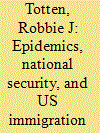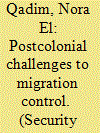| Srl | Item |
| 1 |
ID:
080735


|
|
|
|
|
| Publication |
2008.
|
| Summary/Abstract |
Asia is not a Westphalian system. Transnational politics, in which political communities are subdivided by nominally sovereign boundaries, are just as common in Asia as international politics. This non-Westphalianism is also a persistent feature of Asian security, as subnational, transnational, and international conflicts are embedded in each other. This article examines China's security relations with Central Asia in terms of these features, beginning with a discussion of the developmental and ethno-national politics of China's Xinjiang Uyghur Autonomous Region. The Chinese state has advanced a program of economic modernization and intensive security campaigns to eradicate what it terms the "three evils" of splittism, terrorism, and extremism and to promote a common political identity for modern China. But this campaign has resulted in a segregated Xinjiang in which Uyghurs still look to a transnational community outside of China as an alternative to political assimilation. The second part of the article examines the interaction between transnational and international security in Central Asia, and China's promotion of the Shanghai Cooperation Organization as its preferred mechanism for managing this relationship. The authors identify three aims of the SCO - repressing transnational radicalism; stabilizing regional regimes and their foreign policy orientations; and checking U.S. influence - but argue that these are more restraints on the political options of others than a means to expand China's own options. The fact that the problems of China's transnational regions and the future of SCO remain unresolved leads the authors to conclude that an ascendant China faces an uncertain future in the fluid environment of Central Eurasia.
|
|
|
|
|
|
|
|
|
|
|
|
|
|
|
|
| 2 |
ID:
140558


|
|
|
|
|
| Summary/Abstract |
What are relationships between epidemics, national security, and US immigration policy? This question is important because it sheds light on transnational or nontraditional security areas, American immigration policy, and a pressing issue for US leaders who have recently faced epidemics such as the West Africa Ebola outbreak that began in 2013. This article answers it and lays ground in the area by reviewing epidemics in world history, using International Relations and Security Studies works to specify dangers of contagions for states, and identifying three general immigration measures that American leaders have utilized from the seventeenth century to the present day to protect against contagions, which are (1) policies restricting entrance of foreigners thought to carry specified diseases, (2) the isolation or quarantining of immigrants with contagious disease, and (3) delegating the President with authority to stop immigration in the event of an epidemic abroad. This study has implications for research and contemporary US immigration policy.
|
|
|
|
|
|
|
|
|
|
|
|
|
|
|
|
| 3 |
ID:
132337


|
|
|
|
|
| Publication |
2014.
|
| Summary/Abstract |
Analyses that develop a postcolonial critique of international relations and security studies have outlined the project of 'decolonizing' these disciplines and have underlined the importance of taking into account actors from the South. I seek to do so here through the study of migration policies, in particular by looking for the agency of state actors in so-called countries of origin. This article shows that the study of practices of cooperation is a good strategy for decolonizing the study of international relations. Based upon the example of mid-level cooperation on deportation between France and Morocco, this article focuses on two devices and the practices used for international cooperation on migration controls: the posting of immigration liaison officers and the statistical evaluation of cooperation. This case study shows that such practices open brokering spaces in the transnational security field and allow state actors from the South to challenge the dominance of the North.
|
|
|
|
|
|
|
|
|
|
|
|
|
|
|
|
| 4 |
ID:
117846


|
|
|
|
|
| Publication |
Geneve, Editions Slatkine, 2007.
|
| Description |
150p.pbk
|
| Standard Number |
9782051020343
|
|
|
|
|
|
|
|
|
|
|
|
Copies: C:1/I:0,R:0,Q:0
Circulation
| Accession# | Call# | Current Location | Status | Policy | Location |
| 057092 | 341.7/ALR 057092 | Main | On Shelf | General | |
|
|
|
|
| 5 |
ID:
117852


|
|
|
|
|
| Publication |
Geneve, Editions Slatkine, 2007.
|
| Description |
150p.pbk
|
| Standard Number |
9782051020350
|
|
|
|
|
|
|
|
|
|
|
|
Copies: C:1/I:0,R:0,Q:0
Circulation
| Accession# | Call# | Current Location | Status | Policy | Location |
| 057093 | 327.17/ALR 057093 | Main | On Shelf | General | |
|
|
|
|
| 6 |
ID:
083827


|
|
|
|
|
| Publication |
2008.
|
| Summary/Abstract |
From Sierra Leone to Solomon Islands, developed powers have undertaken a range of state-building interventions in the early years of this century. Two influences appear to shape the emerging state of the art on state building: conceptions about the nature of the state in the developed world; and the postcolonial sensitivities and practicalities that attend the project of intervention. After examining the imperatives driving interventions in fragile states, I explore the remarkable consistency among approaches to state building applied by different states and coalitions in different contexts. I then examine the imperatives driving this convergence of approaches and conclude with some observations tracing the difficulties of contemporary interventions to the current dominant approach to state building
|
|
|
|
|
|
|
|
|
|
|
|
|
|
|
|
| 7 |
ID:
061767


|
|
|
| 8 |
ID:
017657


|
|
|
|
|
| Publication |
Autumn 2000.
|
| Description |
77-91
|
|
|
|
|
|
|
|
|
|
|
|
|
|
|
|